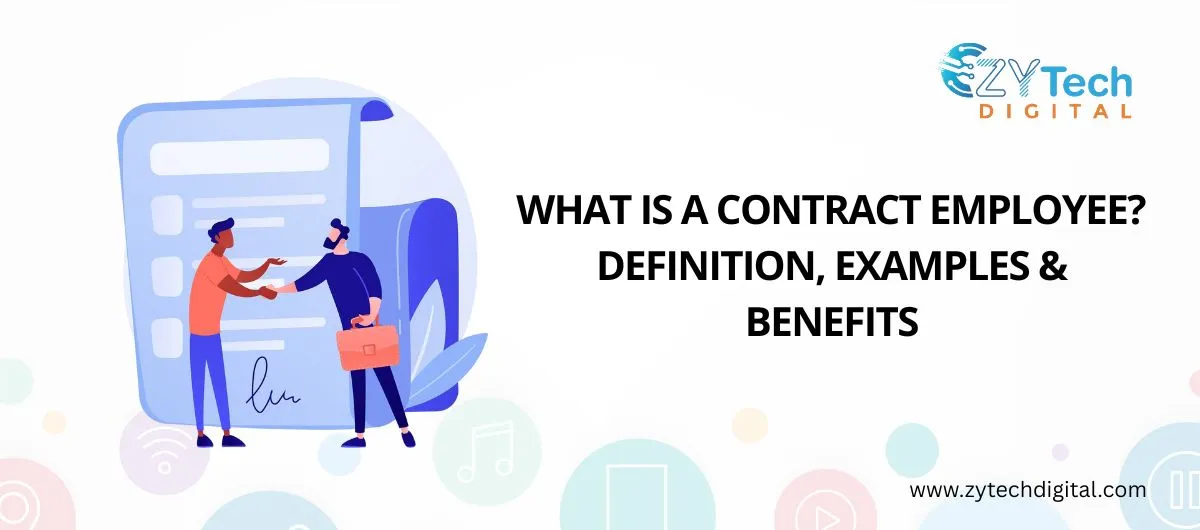
- May 6, 2025
- admin
- 0
If you’ve ever wondered, “What is a contract employee?”—you’re not alone. I asked that same question a few years ago when I left my full-time job in marketing to explore more flexible, independent opportunities. Like many professionals today, I was curious about contract work, its structure, and whether it could offer a better work-life balance.
Let me share everything I’ve learned about contract employment—including how it works, the pros and cons, and real-life examples to help you decide if this career path is right for you.
What Is a Contract Employee?
A contract employee, also known as an independent contractor, freelancer, or work-for-hire staffer, is someone hired by a company or client to perform a specific task, project, or function within a fixed timeframe and usually for a fixed fee.
Unlike traditional full-time employees, contract workers are self-employed or work through staffing agencies, and they don’t have the same benefits or job security as internal staff. However, they enjoy more freedom over their schedules, clients, and the type of work they do.
For instance, when I took on my first contract as an SEO content writer, the client paid me a flat fee for a 10-blog series. I wasn’t on payroll, didn’t receive health benefits, and didn’t need to report to the office daily. Once the project was done, so was the contract.
Contact our career specialists
Contract Employment: A Form of Self-Employment
Contract employment is essentially a form of self-employment. You’re in control of the work you accept, how much you charge, and when and how you complete your assignments. For me, that freedom was game-changing. I could finally build a schedule around my life instead of moulding my life around my job.
RELATED: Self-employed individuals tax center
Many contract workers specialise in one skill, such as graphic design, web development, or data analysis, and market that skill to different companies needing short-term help.
Contract Employee vs Internal Employee: Key Differences
To fully understand contract work, it’s important to compare it with traditional employment. Here’s a side-by-side look based on my personal experience and industry best practices:
| Feature | Contract Employee | Internal Employee |
| Job Duties | Project-specific | Broader responsibilities |
| Training | Minimal or none | Onboarding and upskilling are offered |
| Schedule | Set by you | Set by the employer |
| Pay | Flat fee or hourly rate | Salary or hourly wage |
| Benefits | Rarely included | Often includes insurance, leave, etc. |
| Job Security | Temporary | Long-term/permanent |
| Tax Responsibility | You handle taxes | Employer handles deductions |
Real-Life Example:
When I worked as a contract social media manager, my only responsibility was to create and schedule posts for three months. In contrast, an internal marketing coordinator would have also been expected to write newsletters, attend meetings, and coordinate with vendors, on top of managing social media.
Types of Contract Employees
Not all contract workers are the same. You’ll encounter various titles based on industry and arrangement:
- Freelancer – Works independently for multiple clients
- Independent contractor – Legal term for self-employed workers
- Consultant – Offers expert advice in a particular area
- Temporary worker – Often placed by staffing agencies for short-term roles
- Work-for-hire staffer – Hired to deliver a specific output
In my field, I’ve met contract web developers who charge per website, virtual assistants paid hourly, and consultants who bill per session.

Benefits of Being a Contract Employee
Now, let’s dive into the perks of contract employee work. These are the reasons I—and many others—choose this path:
1. Flexibility
You set your hours, choose your projects, and decide where you work. I’ve completed projects from coffee shops, libraries, and even while travelling.
2. Higher Earning Potential
Contractors often earn more per hour than employees because they don’t receive benefits. For example, one of my clients paid me $80/hour for SEO services—significantly more than my previous full-time job.
3. Skill Specialization
You get to focus on your strengths without being pulled into unrelated tasks. For instance, if you’re a video editor, you’ll likely only be hired for editing, not marketing or admin work.
4. Diverse Portfolio
Working with multiple clients helps you build a diverse and impressive resume. I’ve created content for e-commerce brands, legal firms, and education startups—all within a single year.
Disadvantages of Being a Contract Employee
Of course, contract work isn’t perfect. Here are some challenges I’ve faced:
1. No Guaranteed Income
You may go weeks or months between contracts. It took me three months to land my second client after my first contract ended.
2. Lack of Benefits
You need to handle your own health insurance, retirement, and paid time off. That means budgeting becomes crucial.
3. Administrative Burden
From invoicing to tax filing, you’re in charge of it all. I ended up hiring an accountant to avoid tax mistakes.
4. Isolation
Without coworkers or an office, work can get lonely. I joined online communities and co-working spaces to stay connected.
What Jobs Can Contract Employees Do?
Contract roles exist across almost every industry. Here are common areas where contract jobs thrive:
- App design and development
- Web design
- Social media marketing
- SEO and content writing
- Graphic design
- Legal services
- Customer support
- Online tutoring and teaching
- Translation
- Virtual assistant services
- Transcription
- Video and audio editing
- Research and data analysis
I once worked alongside a contract translator who helped an e-commerce company expand into the French market. She worked remotely from Quebec, charged per document, and finished her tasks on her timeline.
How Are Contract Employees Paid?
Payment models can vary. Here are the most common:
- Flat fee for a project – e.g., $2,000 for a website redesign
- Hourly rate – e.g., $40/hour for freelance writing
- Milestone-based – e.g., 50% upfront, 50% upon delivery
Platforms like Upwork, Fiverr, and Toptal are popular starting points for new contractors, offering secure payment systems and client discovery tools.
Are Contract Employees in Demand?
Absolutely. More companies are embracing the gig economy and hiring demand specialists. Search engines like Google frequently list contract roles under:
- Part-time jobs
- Full-time contract work
- Remote contract jobs
- Urgently needed roles
Many startups and even large enterprises now prioritize agility by filling short-term needs with contract professionals instead of hiring full-time staff.
How to Become a Contract Employee
Interested in starting your contract employee journey? Here’s a quick step-by-step plan based on my personal path:
- Identify your skillset – Choose what services you’ll offer
- Build a portfolio – Even small personal projects count
- Register as self-employed – Depending on your country
- Set your pricing – Research competitors in your niche
- Create profiles on job platforms – Try Upwork, Freelancer, LinkedIn
- Market your services – Use SEO, social media, and referrals
- Track your finances – Use tools like QuickBooks or FreshBooks
Final Thoughts: Is Contract Work Right for You?
Becoming a contract employee changed the way I live and work. It gave me the freedom to choose my clients, set my hours, and work from anywhere. But it also demanded discipline, good communication, and smart financial planning.
If you’re someone who values independence, has a marketable skill, and enjoys variety, then contract employment might be your ideal path. Just be prepared to learn as you go, and don’t be afraid to start small.
Whether you’re eyeing a role in remote customer service, freelance web design, or contract-based social media marketing, the opportunities are out there—waiting for someone like you.
READ MORE: Contract to Hire
Explore Contract Opportunities on Zytech Digital
If you’re ready to get started, check out these related job categories on Zytech Digital:
- Part-time jobs
- Full-time contract jobs
- Remote contract jobs
- Urgently needed roles
Frequently Asked Questions (FAQs) about Contract Employees.
Contract employees work on a temporary or project basis, often without benefits like health insurance or paid time off. Full-time employees are permanent staff with set hours, job security, and company-provided benefits.
No, contract employees usually do not receive traditional employee benefits such as health insurance, paid leave, or retirement plans. However, they often charge higher hourly rates to compensate and can purchase their benefits independently.
To become a contract employee, build a strong resume, showcase your skills, and register on freelance job platforms like Upwork, Fiverr, or Indeed. You can also reach out directly to companies offering project-based roles.
Contract employees are often paid per project or hourly, depending on the agreement. Payment terms vary—some receive a portion upfront and the rest upon completion, while others are paid in milestones or after invoicing.
Yes, since they are typically self-employed, contract employees must handle their own taxes, including income tax and self-employment tax. It’s often recommended to work with a tax professional.
Speak With Expert
Fill The Form Below

